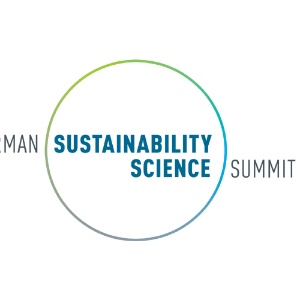| Time: | July 8 – 9, 2021 |
|---|---|
| Download as iCal: |
|
The German Sustainability Science Summit 2021 will take place as an interactive virtual online event on 8 and 9 July 2021. The Summit continues the bi-annual series of the German Future Earth Summits organised by the German Committee Future Earth (Deutsches Komitee für Nachhaltigkeitsforschung, DKN).
The Summit will provide a platform for the exchange on the latest scientific findings in the field of sustainability research. It will cover a range of topics from normativity, epistemology and feasibility of sustainable development, to extreme events, resilience, social cohesion and well-being, to climate change, biodiversity, nutrition and health.
In addition to scientific sessions with presentations and discussions, panel discussions, an interactive poster session and other interactive formats will provide space for exchange, discussion and networking among the international science community working on sustainability issues – within and across disciplines.
The Summit is free of charge.
Participation AdvanceAEC
Prof. Dr.-Ing. habil. Manfred Bischoff (Institut für Baustatik und Baudynamik, Universität Stuttgart, SFB 1244; AdvanceAEC) will host Session SSII7, Sustainable Planning and Construction on Friday, 9 July 2021 1:20-2:20 p.m.; Scientific Session Block II (Parallel Sessions).
AAEC will be presented by Prof. Dr.-Ing. Dr.-Ing. E.h. Manfred Curbach (Institut für Massivbau, Technische Universität Dresden, SFB/TRR 280; AAEC).
Speakers (in alphabetical order)
Prof. Dr.-Ing. Dr.-Ing. E.h. Manfred Curbach
Institut für Massivbau
Technische Universität Dresden
Prof. Dr.-Ing. Andrea Benze
Professur Städtebau und Theorie der Stadt
Hochschule München
Prof. Dr. Werner Lang
Lehrstuhl für energieeffizientes und nachhaltiges Planen und Bauen
Technische Universität München
Prof. Dr.-Ing. Dierk Raabe
Max-Planck-Institut für Eisenforschung GmbH
Düsseldorf
Abstract
The built environment is of central ecological, economic, social and cultural relevance. The building industry consumes about 40% of global resources and energy. Over the next 35 years, buildings for an additional 2.6 billion people will need to be constructed. Thus, 8 out of the 17 goals in the UN 2030 Sustainability Agenda relate to the construction industry.
While construction is intrinsically connected to the disciplines of architecture and civil engineering, a strong multidisciplinary effort, including non-technical disciplines such as politics and sociology, is required to tackle these challenges by developing new technologies. Carbon lean production, recycling and circular economy, enhanced productivity through digitalisation, reduction of mass and embodied energy, as well as the identification of synergies and acceleration effects on the one hand, and potential trade-offs of objectives on the other, are typical challenges.
The session exemplarily describes related research efforts on three levels:
1. Small scale, material level: Sustainable Metallurgy and Metals
2. Medium scale, structural level: New Technologies for Sustainable Construction
3. Large scale level: Resilient transformation of urban spaces
Format
Each level will feature keynote speeches followed by a panel discussion.
Expected outcomes
In addition to sharing information about ongoing fundamental research efforts, we hope to find new partners to join us in our mission. We also seek to identify new areas of research that contribute to the aim of sustainable planning and construction.


